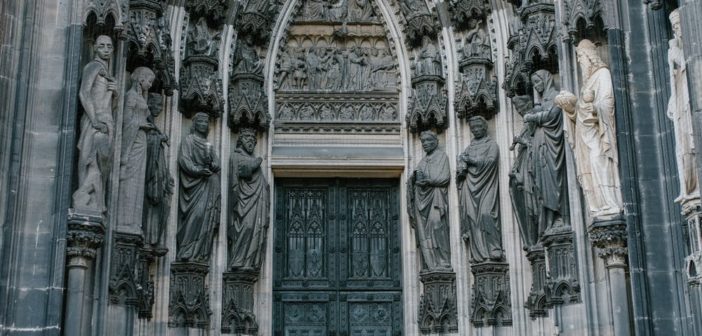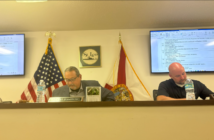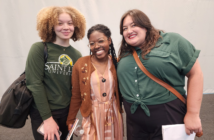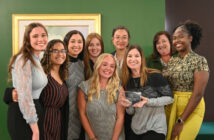By Owen Robertson, Staff Writer
On March 20, in the Greenfelder-Denlinger Boardroom, a dialogue was held between representatives of Catholicism, Judaism and Islam.
“A feast for our minds and our hearts” said Dr. Arthur F. Kirk, Jr. President of Saint Leo University. Speaking about hosting the discussion. “A new departure for the Center of Catholic Jewish Studies, first to include a member of Islam.”
The 45 minutes of the meeting was spent in endless verbose greetings and platitudes. Finally, Father Stephan Brown provided a brief welcome to the religious communities saying “Great respect in coming together in dialogue” regarding the three faiths.
The main question of the interfaith dialogue was; should Islam look to its monotheistic partners as models for successful integration into American religious life or, given the dynamics of the 21st century, should it demand a different approach in the creation of an American expression of Islam?
The first speaker, Rabbi A. James Rudin, provided a historical perspective in the first portion of his speech, retracing the importance of religion in the United States. Rudin briefly provided the history of religious conflict in the United States for Catholics and Jewish believers. Concluding the first portion of his speech about the Second Vatican Council in 1965, where leaders of Judaism and Catholicism came together to discuss how their faiths could work together and meld into the religious landscape of the United States.
“Every generation must rethink, recast, redo and reestablish the role of religion in America.” said Rudin but he pointed out that very often those not of the dominate faith in the United States are asked “can you be Catholic or Jewish and an American?” Rudin provided the answer by looking to pluralism, that every “group” has a contribution to make to society, be they Catholic, Jewish, or Islamic.
Rabbi Rudin’s last portion of his speech asked the difficult question “Can we (Catholicism, Judaism, and Islam) survive, prosper or thrive in America or do we settle for Mickey Mouse, MTV or McDonalds in lieu of our faith.” According to Rudin, the people of non-dominate faiths have been impacted by living in the United States, as well as they too have impacted American culture. The question for Rabbi Rudin is what will be “the impact of Islam on America and America’s impact on it?”
Dr. Eugene Fisher, Former Associate Director of the Secretariat for Ecumenical and Interreligious Affairs of the United States Conference of Catholic Bishops; Distinguished Professor of Catholic-Jewish Studies, Saint Leo University, represented the Catholic point of view for the second part of the discussion. He offered that the American followers of Islam should have hope regarding their religious persecution by looking to the past persecution of Catholics and Jews in the United States.
“Catholic, Jewish and Muslims all have a very high shared understanding of social issues and that Catholics and Jews have a shared commonality between them in their religious integration experience” said Fisher.
Dr. Fisher, like Rabbi Rudin before him, also pointed out the value of pluralism within the Catholic faith stating the “necessity of religious pluralism is now part of Catholic teachings.”
This historical background for the integration of Catholicism and Judaism into American culture provided a solid starting place for the dialogue.
Daisy Kahn, the third and final speaker for the discussion, is the Executive Director of the American Society for Muslim Advancement (ASMA). Her speech provided a lighter approach to the question posed by the discussion, relying less on history and more on current views and actions.
“Tearing down walls of prejudice is really hard work” Kahn said “Shaping Islamic religion in America is a daunting task.”
To further the dialogue, Kahn made the claim that “Islamic values and American values are the same. The issue is not the values but the basis of the values.” Boldly moving forward, she then made the statement that “Islam looks to Judaism (in America) as a model of how to change.” However, she added that “American Islam cannot be just created for in this modern age there is a global judgment that occurs.”
Kahn feels that prior to 9/11 there were great strides in interfaith tolerance and understanding of American Muslims, however, after that day all the work of many years changed overnight.
American Muslims were faced with the question of how can you be a follower of Islam and an American. Kahn says the answer is in the youth of American Islam. It is through them that new leaders of Islam will be found who can provide the dual identity of being American and being a follower of Islam.
Dr. Fisher, during his speech, offered some insight into this question as well pointing out that “Muslims today are make some of the strongest protests about the killing of civilians and are some of the most loudly patriotic.”
In the end, however, the dialogue didn’t truly provide any strong answers or resolution to the question. The organizers of this interfaith discussion hopefully will host another gathering of minds to discuss this truly pressing issue. However, it may be better for them to reduce the pomp and circumstance that occurred in this discussion and allow for more a meaningful interaction, by changing the format from lecture to true dialogue. Additionally, it may even be notable that the next discussion should perhaps be between citizens of Saint Leo University who represent not only the faiths in questions, but the American perspective as well as the future.





